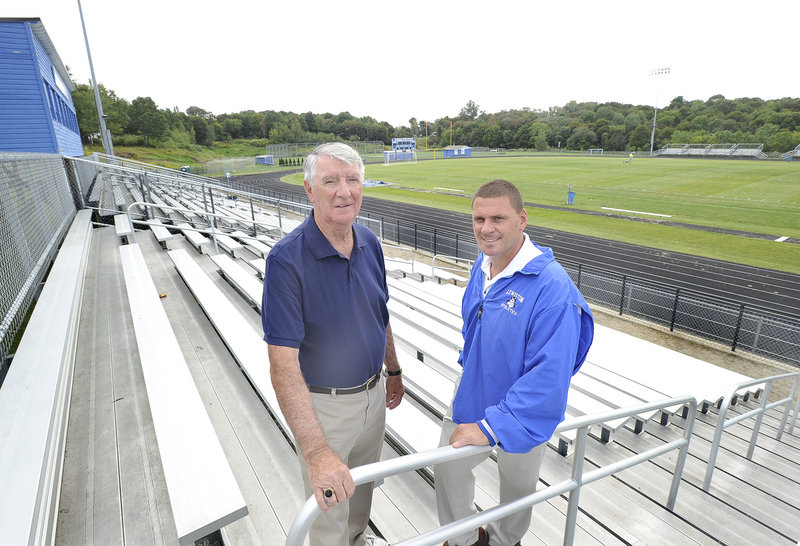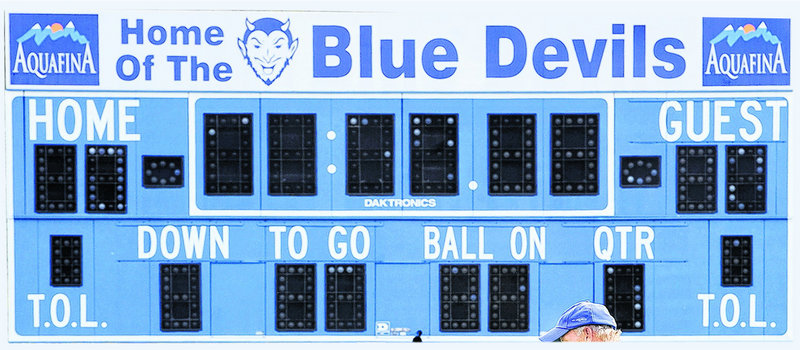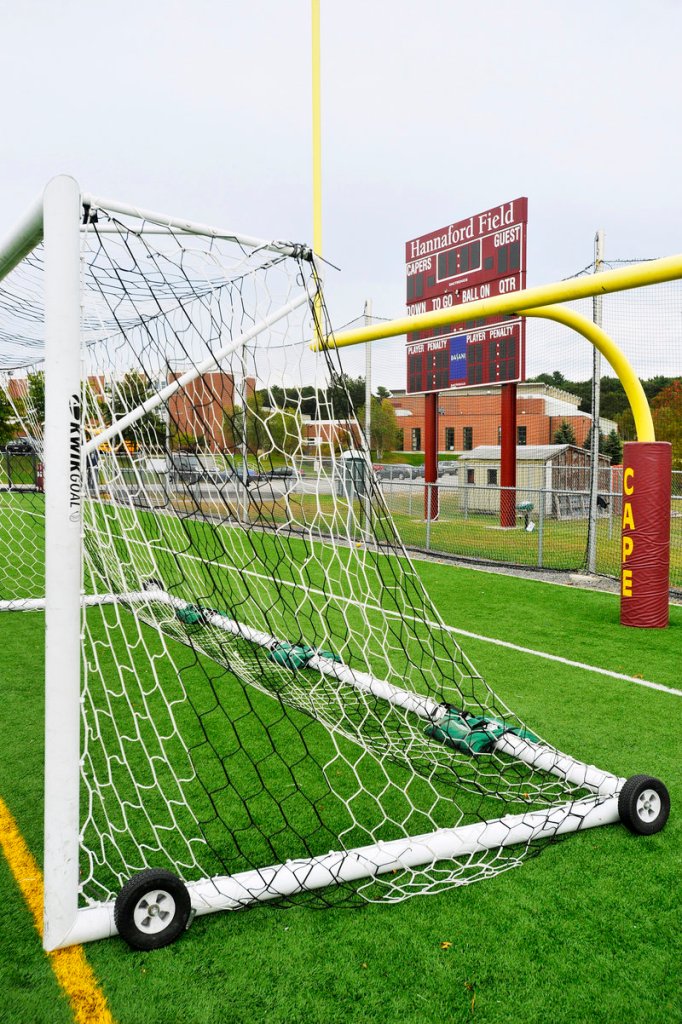LEWISTON – High school football players here have been playing at Don Roux Field since 2001, when David Roux, son of the late community benefactor, donated money to upgrade the athletic facilities at the Franklin Pasture Sports Complex.
Eleven years later, the complex needs more renovations, and the community is taking a new approach to paying for them: selling naming rights, or sponsorships.
Knowing the deep roots that Don Roux had, not only in Lewiston High’s sports history but in the community, athletic director Jason Fuller has made it clear that Roux’s name will not be lost. While the complex may be named something else, he said, “this field will always be Don Roux Field at ‘This’ complex, whatever that might be.”
Selling naming rights is nothing new to professional sports teams. The New England Patriots play at Gillette Stadium, the Pittsburgh Steelers at Heinz Field, the San Francisco Giants at AT&T Park, the New York Giants and Jets at MetLife Stadium, the Boston Bruins and Celtics at TD Garden.
But the practice has been picked up in recent years by high schools looking to repair, or replace, aging stadiums or gymnasiums amid dwindling budgets.
In the past, high schools would generally honor a former coach, standout athlete or community benefactor by dedicating the field or gym to that person.
Now, companies such as New Balance, Rust-Oleum, Poland Spring, IKEA and Verizon have provided high schools from Massachusetts to Illinois, Arkansas and Washington state with hundreds of thousands of dollars to improve facilities in exchange for having their names on the finished product.
“It’s certainly happening,” said Bruce Howard, a spokesman for the National Federation of State High School Associations. “I’ve been here for 27 years and I remember a time long ago when just the thought of any kind of corporate sponsorship was an ouchy feel for state associations or high schools.
“But we’ve obviously progressed to a point where something like this is accepted.”
AVOIDING ASKING TAXPAYERS
Lewiston is seeking to renovate its athletic fields at the city-owned Franklin Pasture Sports Complex by selling naming rights — not only for the complex, but individual fields, concession stands and scoreboards as well. It is even seeking sponsorships for individual teams.
The renovations would include two artificial turf fields — one for football and soccer, the other for lacrosse and field hockey; new lighting, seating, concession stands, a new track surrounding the football field, a new irrigation system, resurfaced tennis courts, rest rooms and storage facilities.
The baseball and softball fields will get a facelift as well. The cost: $5 million, which includes $1.2 million for future maintenance.
“I think we’re doing it the right way,” said Fuller. “It would be unrealistic at this point to look at the people of Lewiston and say, ‘Let’s raise taxes to build this for us.’ For us, I think this is the best avenue to do it. I don’t want to burden the taxpayers.”
Both the Lewiston School Committee and City Council approved the plan, which was the brainchild of Fuller and other members of the Franklin Pasture trustees, a group that oversees the sports complex. The trustees came up with a corporate underwriting program to establish the naming rights costs, allowing for even the smallest donation to be recognized.
“We didn’t want to just start asking for money without a plan in place, so we created a corporate underwriting plan that kind of dictates how money could be donated and what the guidelines are if you donated money,” said Fuller.
For example, you can put your company name on the entire complex for 15 years for $750,000. Too pricey for you?
Well, for $500,000, you can have your name on the lacrosse and field hockey complex for 15 years. For $250,000, your company name can be on the track for 10 years.
Still too much? If you’re interested in being one of four scoreboard sponsors, it would cost $25,000 for five years.
There are also much smaller levels: for $500, you can have your personal or corporate name etched onto a granite brick, which will be part of a walkway into the stadium. Those who want to contribute $250 will be listed as well.
“If someone offers us $5, we’re going to recognize them,” said Fuller. “It all adds up.”
Heather Hunter, the finance director for the city of Lewiston and one of the project’s top supporters, said the group has received plenty of interest in the month or so since receiving approval from the city.
“As far as cash flowing in, no,” she said. “But there is a lot of interest, especially in the brick program for the alumni. And there are companies out there considering our various levels of support.”
While there was some initial concern over what type of sponsorships would be accepted, Fuller and Hunter made it clear that any sponsorships would have to fit in with the school’s healthy lifestyle philosophy: no tobacco, no alcohol, no drugs, no casinos.
“We need to be conscious of what we’re endorsing and supporting via the naming rights,” said Fuller.
Still, not everyone is pleased.
Lewiston school board member Jim Handy voted against the plan when it was originally discussed.
“I really haven’t changed my view of it,” he said. “I think that children in our schools are battered with enough advertising.”
In addition, Handy doesn’t like the fact that the people accepting the sponsorships — members of the Franklin Pasture Trust — are not affiliated with the city. “I think there should be some formal involvement on the part of elected officials so that we’re somewhat accountable,” he said.
Handy did say that he realizes schools are being forced to look at corporate sponsorships.
“There’s no question that partnerships are the way to go,” he said. “But if a company is truly being altruistic in their attempt to help, donate the money without expecting anything in return.”
COMMUNITY INVOLVEMENT
In some instances, in fact, companies don’t ask for anything in return.
Artificially surfaced fields at Cape Elizabeth High and the University of Southern Maine in Gorham are both called Hannaford Field.
But neither of those schools sold naming rights. The naming of the fields was in response to the size of the gifts from Hannaford Bros., the supermarket chain based in Scarborough, which provided $100,000 to Cape Elizabeth and $250,000 to USM.
Hannaford has a long history of making donations that, according to company spokesman Mike Norton, “make significant long-term community benefits.”
In addition, the site of the field in Cape Elizabeth is the same as the original Hannaford family farm.
In both those instances, the donation also provided a lift to the fundraising campaigns.
“That lead gift helps you move forward,” said Al Bean, the athletic director at USM.
Michael Ott, a former Cape Elizabeth resident who was one of the organizers in the fundraising effort, agreed: “We were bumping along and doing OK for a fundraiser. But once we were able to secure that piece of it, it gave us the belief we could get the job done.”
In many cases across the nation, similar projects were more than just an upgrade of a high school facility. They opened the facility up to the community.
“What I’ve found,” said Jeff Thoreck, the athletic director at Cape Elizabeth, “is that it allows us to connect more with the community.”
That’s what they hope to do in Lewiston.
“I think there is a vested interest in the community to do this project,” said Lewiston’s Hunter. “This is not just a high school project. It’s a community project. The recreation center uses the fields for programs throughout the summer, the general populace enjoys walking on the track. It’s important to have that type of complex in the middle of your downtown.”
Officials in Presque Isle also provided corporate sponsors with more than was asked.
The artificial surface at the Presque Isle middle school sports complex — which is used for high school and community events — features the logos of three corporate sponsors that helped offset the $650,000 price tag for the turf. Each sponsor paid $50,000 to have its logo displayed on a 10-square-foot patch of turf.
Dr. Gehrig Johnson, the superintendent of School Administrative District 1, which covers five towns including Presque Isle, approached Coca-Cola, Key Bank and a local insurance company (Maine Mutual Group), and offered the patches to them to raise money for the entire project, which was completed seven years ago at a cost of $1 million.
“Given that kind of money for a small logo on our turf, I think they would have done it anyway,” said Johnson. “But it’s something we offered to them.”
Dan Lebowitz, the executive director of the Center for the Study of Sport in Society at Northeastern University in Boston, said there’s nothing wrong with selling sponsorships and naming rights.
“Personally, I think that if you’re creative or innovative enough to find funding that creates a positive experience, that increases access to high school sports, it’s a good thing,” he said.
There are many times when the private sector and the public sector come together for a good cause, he said. This is one of them.
It will benefit the students by providing access to sports without forcing user fees on them. It will benefit the community by providing a safe environment to gather and play.
“It speaks a lot to the corporate social responsibility of the corporation that does it,” he said. “To me, it’s a good use of advertising dollars and one that actually benefits people.”
GETTING CREATIVE ABOUT FUNDS
Given the nation’s current economic state, athletic directors are looking at any options to earn extra funding.
Listen to the public address announcer at a Sanford High football game at Cobb Stadium and you’re likely to hear that the game balls are “sponsored” by one of two local businesses: Edgar’s Olde Mill Burgers and Webb Oil, both owned by former Sanford athletes.
“They’ve both been very supportive of the program,” said Gordie Salls, the athletic director at Sanford. “There’s no charge for the announcement. But if we need something and we don’t have the money in our budget for it, we can call them. They’re there to help us.
“It’s just another way to be creative (with your budget). If you’re not creative, you’re going to fall behind the eight-ball.”
Dennis Walton, the athletic director at Biddeford, is selling advertising strips to put on the bleachers of his school’s two gyms.
Paul Vachon, the athletic director at Cony High in Augusta, noted that his basketball players use travel bags that include the logo of a local roofing company that sponsors the bags. The scoreboards in the gymnasium are sponsored by a local auto dealer. The gym floor features logos from local businesses.
“I don’t think you saw that stuff 20 years ago,” he said.
That’s why athletic directors across the state are applauding Lewiston’s creative approach.
“On a much smaller scale, we have had conversations about corporate sponsorships,” said Ted Welch, the athletic director at York High. “No one wants to have their athletic programs up for sale, but it’s tough to make capital improvements. It’s not easy to raise the kind of money that is needed to improve your facilities.”
And it’s not like this isn’t happening elsewhere. For instance, Little Rock, Ark., Central High plays at Quigley-Cox Stadum at Verizon Wireless Field. The naming rights cost $250,000.
Springboro, Ohio, athletes play at CareFlight Field because Miami Valley Hospital bought naming rights for 22 years at a cost of $1.9 million.
Teams in Toms River, N.J., play at Poland Spring Arena, for which Nestle Waters North America Inc., pays $50,000 a year.
In Massachusetts, Commerce Bank & Trust paid $1 million to help renovate Foley Stadium, which serves Worcester public schools. It’s now called Commerce Bank Field at Foley Stadium. And the city of Gloucester received a $500,000 gift from the athletic footwear manufacturer New Balance to renovate its athletic facilities, which will be known as New Balance Track and Field at Newell Stadium for the next 10 years.
“This is clearly something that is happening all over the country and is probably the wave of the future,” said Gary Stevens, the athletic director at Thornton Academy in Saco. “Athletic directors from schools throughout the country are trying to find creative ways to preserve programs, improve facilities and make changes in their programming. All those things cost money, and given the fact that public coffers are shrinking, people are going outside the usual tax base to do those projects.”
And companies, both local and national, are willing to help, said Stevens, because “it’s instant and repeated advertising.”
Sanford’s Salls realizes the money has to come from somewhere, but hopes there are limits.
“We’re moving more and more toward the European model (of youth sports),” he said. “Hopefully we don’t get there.”
In Europe, young people play on club teams. All the money comes from sponsors, and even team uniforms carry sponsors’ names.
‘TASTEFUL ACKNOWLEDGEMENTS’
Lewiston’s Hunter said organizers are currently working on the design of the project and how they will recognize the sponsors.
“There will be tasteful acknowledgements throughout the complex,” she said.
The group is prioritizing the project. Phase one needs to be the main complex, putting artificial turf on the football/soccer field and getting a new track.
Hunter said the hope is to have enough sponsors garnered over the winter so that construction can begin in the spring.
Fuller knows it will take time, but he’s confident the project will get done.
“We haven’t re-invented anything,” he said. “Other communities have used this model. We’re just going to see what’s out there and try to make it happen. I’m optimistic the community’s going to get behind us and make it happen.”
Staff Writer Mike Lowe can be contacted at 791-6422 or at:
mlowe@pressherald.com
Twitter: MikeLowePPH
Send questions/comments to the editors.






Success. Please wait for the page to reload. If the page does not reload within 5 seconds, please refresh the page.
Enter your email and password to access comments.
Hi, to comment on stories you must . This profile is in addition to your subscription and website login.
Already have a commenting profile? .
Invalid username/password.
Please check your email to confirm and complete your registration.
Only subscribers are eligible to post comments. Please subscribe or login first for digital access. Here’s why.
Use the form below to reset your password. When you've submitted your account email, we will send an email with a reset code.